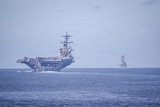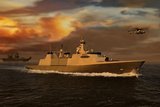LIMA 2015: Littoral Combat Ship programme only ‘slightly off track’
Boustead Heavy Industries Corporation (BHIC), responsible for constructing the Royal Malaysian Navy’s (RMN’s) six 3,000t Second Generation Patrol Vessel - Littoral Combat Ships (SGPV-LCS), revealed the project is only ‘slightly off track’ in terms of schedule.
Anuar Murad, director of BHIC’s defence & security division, told Shephard the programme ‘is looking good’, and that delays are at least partially due to still pending decisions from the Ministry of Defence on what minor equipment is to be selected for the new ships. Examples include air compressors and chilled-water plant for the air-conditioning system.
Murad said that, according to the baseline schedule,
Already have an account? Log in
Want to keep reading this article?
More from Naval Warfare
-
![Spain’s F100 upgrade mirrors Aegis modernisation paths in allied navies]()
Spain’s F100 upgrade mirrors Aegis modernisation paths in allied navies
The Spanish Navy’s Alvaro de Bazan-class of air defence frigates will receive the latest Aegis Weapon System technology among other modernisations to extend the service life to 2045.
-
![UK’s Fleet Solid Support ship programme deemed on track despite steel supply concerns]()
UK’s Fleet Solid Support ship programme deemed on track despite steel supply concerns
Shipbuilders are saying the programme is going ahead on time as the government estimates 7.7 million tonnes of steel are needed for 2026 infrastructure projects.
-
![As Indonesia doubles up its order, who else is looking at the Arrowhead 140 frigate design?]()
As Indonesia doubles up its order, who else is looking at the Arrowhead 140 frigate design?
The adaptable design of Babcock’s Arrowhead 140 frigate, already selected by the UK Royal Navy and Poland, has led to more orders from Indonesia while other countries continue to weigh it up.





















